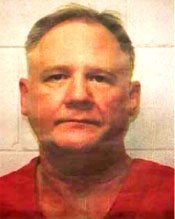Monday, April 21, 2008
As Earl Berry's attorneys continue their protests that the state's method for killing inmates is flawed, Mississippi Attorney General Jim Hood filed a motion yesterday to reset the execution of Earl Berry for the 1987 murder of Mary Bounds to May 5—incidentally Berry's 49th birthday. Hood's announcement came after the U.S. Supreme Court lifted Berry's stay of execution Monday after ruling last week that lethal injection is not unconstitutionally cruel. "The higher court's ruling has cleared the way for us to move forward in the Berry case," Hood said in a statement. "Our filing today will request that an execution be set to take place within 30 days." Berry's attorneys, however, argue that the court's decisions does not render Mississippi's lethal-injection method constitutional.
"The defense team for Mr. Berry is currently researching and investigating all legal options available at this juncture in his case," attorney Jim Craig said. "We will, however, continue the lawsuit challenging Mississippi's procedure for lethal injection on behalf of the other prisoners on death row. The U.S. Supreme Court affirmed only a procedural dismissal of Mr. Berry's challenge to lethal injection; it did not decide whether Mississippi's protocol for lethal injection is constitutional. We intend to prove that Mississippi does not use the safeguards approved by the Court in the Kentucky case, and the higher risk of suffocation and internal burning during executions here is unacceptable."
The U.S. Supreme Court last week gave its blessing to its use of the lethal injection for state executions. The attorneys of Mississippi death-row inmate Earl Berry had previously filed a lawsuit on his behalf against the use of lethal injection in Mississippi. Jim Craig, David Voisin and Jamie Priest from Jackson and Jack Williams from Oxford issued the following statement today about the ruling in the case of Baze v. Rees.
We have studied the U.S. Supreme Court opinion issued today which approved Kentucky's procedure for lethal injections. The Chief Justice's opinion said that Kentucky uses safeguards which reduce the risk that a prisoner will be consciously suffocated or internally burned by the chemicals used in lethal injection. These include the educational background required of the execution team, the training given those persons, and the way the drugs are administered. The Mississippi DOC has not produced any evidence that those kinds of safeguards are used in executions at Parchman. We believe the U.S. Supreme Court should continue to consider Berry's petition for certiorari because of these different facts.
Berry's attorneys filed this brief with the U.S. Supreme Court last week.
Berry was convicted and sentenced to death by a Chickasaw County jury for the Nov. 29, 1987, murder of Mary Bounds. He later confessed to the murder. He is one of 63 inmates currently on Mississippi's death row.
Previous Comments
- ID
- 118699
- Comment
Do they think it's different enough for the Supremes to even want to tread back into this debate?
- Author
- Ironghost
- Date
- 2008-04-17T13:26:27-06:00
- ID
- 118804
- Comment
30 days? Hasn't MS waited long enough? Sheesh.. do it already.
- Author
- LawClerk
- Date
- 2008-04-21T18:51:57-06:00
- ID
- 118870
- Comment
Well, that's one hell of a birthday present. :s
- Author
- Lady Havoc
- Date
- 2008-04-23T12:23:43-06:00
- ID
- 118872
- Comment
What's the rush, LC?
- Author
- golden eagle
- Date
- 2008-04-23T13:12:33-06:00

Comments
Use the comment form below to begin a discussion about this content.
Sign in to comment
Or login with:
OpenID